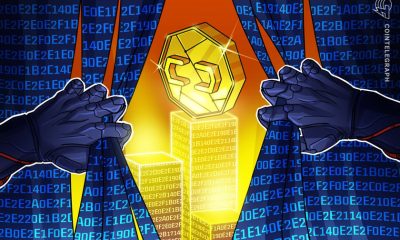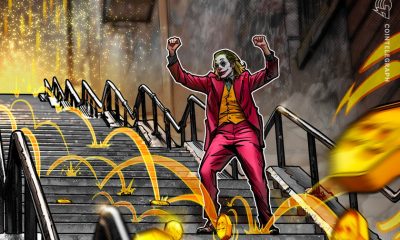Blockchain
Groceries to luxury cars: The state of crypto adoption in Dubai

Cointelegraph visited a grocery store and a luxury car club to learn how crypto has been adopted in Dubai.
The city of Dubai has been very welcoming to the crypto space, providing much-needed regulatory clarity to help the industry thrive. While this attracts native Web3 and crypto businesses to the emirate, even non-crypto businesses started integrating technologies into their operations, like cryptocurrencies, nonfungible tokens (NFTs) and even the metaverse.
Cointelegraph explored parts of Dubai to find out how crypto and Web3 technologies have been integrated within some businesses in the emirate.
Ordering groceries with cryptocurrencies
Day to Day, one of Dubai’s most popular and affordable grocery chains, announced that it started accepting crypto payments last year. On Aug. 8, the local media outlet, Khaleej Times, reported that the hypermarket has started to accept crypto payments in their online store and several branches throughout Dubai.
Cointelegraph recently visited the Al Quoz branch and tried to use crypto to buy groceries. However, despite the advertisements of accepting crypto displayed all over the store, the staff said in-store crypto purchases are unavailable and directed Cointelegraph to use the online store instead.

Despite the lack of support in one branch, the good news is that crypto users can still shop using crypto on the online store. The branch accepts Bitcoin (BTC), Ether (ETH), Tether (USDT) and various other coins as payment for online orders.

Cointelegraph also reached out to the official Day To Day hypermarket team to get their comments but did not get a response.
Luxury cars in the real world and in the metaverse
Dubai appeals to many who want a taste of luxury, and one of the most popular ways to experience luxury is to drive expensive cars. Cointelegraph spoke with a luxury car club based in Dubai that found a way to utilize NFTs and various Web3 technologies in their business.

A luxury project called Elchai Group is bringing luxury cars to the decentralized community through NFTs. Maria Xenofontos, Elchai Group’s chief marketing officer, told Cointelegraph that NFT holders who are also automatically members of their car club would be able to rent physical exotic cars from Elchai’s car collection. Xenofontos also explained that:
“Our team is bringing a luxury car club to the metaverse. We’re already developing The Universe Eye, a metaverse project that will first replicate the city of Dubai. […] The metaverse will facilitate private events, celebrity concerts, and a luxury supercars showroom.”
According to Xenofontos, the project is also bringing their luxury car club to the metaverse and gave Cointelegraph a sneak peek at their metaverse project that replicated one of Dubai’s most popular attractions, the Dubai Eye.

When asked about NFTs, the executive said that the space needs more exploration at the moment. “NFT as a form of ownership is something to explore more, and I am sure we will see their actual use case more in the coming years,” she said.

Flavio Elia, the founder and CEO of Elchai Group, told Cointelegraph the inspiration behind the project. “It’s simple, really. After 20 years in the luxury car trading business, I wanted to pursue my dream of forming a car club. It’s my love for cars and the endless possibilities in the metaverse that has driven me to pursue this project,” he said.
Some crypto payment integrations just don’t last
Apart from Day To Day, other businesses within Dubai have also announced various crypto payment integrations in the last year but failed to gain traction. On March 3, 2022, the Indian restaurant, The Bhukkad Cafe, announced that it accepted BTC payments. Almost a year later, Cointelegraph visited the store to check if they still accepted Bitcoin. According to the store clerks, they only accept cash or card.
Related: How the UAE became the Middle East’s digital asset champion
On Feb. 16, 2022, the media outlet, Time Out Dubai, reported on a new online restaurant called Doge Burger, taking inspiration from dog-themed tokens like Dogecoin (DOGE) and Shiba Inu (SHIB). But when Cointelegraph tried to order one of the burgers, the order did not arrive. Exactly one year later, the project’s website cannot be accessed anymore.
Apart from food businesses, a popular school in Dubai also dipped its toes into crypto payments but backtracked almost immediately. On Feb. 9, Binance announced a partnership with the Canadian University Dubai to enable crypto payments within the university. However, less than a day after the announcement, the university backtracked on accepting crypto, citing technical roadblocks.
Dear CUD Community,
For technical reasons, CUD will not be accepting cryptocurrency as a method of payment, until further notice.
We apologize for any inconvenience. pic.twitter.com/b9rERYHR7g
— CUDubai (@CUDUAE) February 10, 2023
Despite some projects struggling with crypto integrations, Dubai’s crypto industry is still alive. In a recent Cointelegraph interview, Crypto Oasis co-founder Saqr Ereiqat said that many talents from around the world are coming into the United Arab Emirates (UAE) to work in the crypto space.
“We are witnessing an unprecedented migration of talent and capital from around the world into the UAE,” he said. In addition, the executive highlighted that at the moment, more than 8,300 professionals are working in the space in the Crypto Oasis alone.

















